1957-1966 Honorees
SAMUEL THOMAS ANGOTT
Samuel Thomas Angott, son of Mary Ash and Michael Angott, was born in Buffalo, New York, December 10, 1898. The fourth oldest of 11 children, Mr. Angott is one of a long line of self-made man. He attended grade school in Hawtrey, Ontario, and high school in Woodstock, Ontario. Samuel resided on a farm near Otterville, Ontario, Canada, until 1914, at which time he moved to Detroit, Michigan, where he became employed with Ford Motor Company. For a time he was Henry Ford’s office boy. Following employment with Ford Motor Company, Mr. Angott became associated with the Absopure Ice Company, later becoming its plant manager. He became owner of the Consumer’s Ice and Fuel Company, 1930; owned and operated the Detroit Pure Mild Company (Farm Maid Dairy), White Rock Corporation, and Reddi-Wip. Mr. Angott served as a member of the Detroit Mild Dealers Association from 1930 to the present time, being president from 1941 to 1959. He assumed active constructive leadership in directing their activities with favorable public relations between producers and consumers. Mr. Angott found time also to be: a member of the American Indian Foundation; a member of Detroit’s Labor-Management Committee (1947 to 1948); Chairman, Board of Trustees, W. Bloomfield School District (1937 to 1941); Chairman, building commission of Our Lady of Refuge Church (1945 to 1952); D.S.R. Commissioner (1955); Chairman, Commission (1958); Member, Board of Wayne County Supervisors.
ARWED C. BALTZER
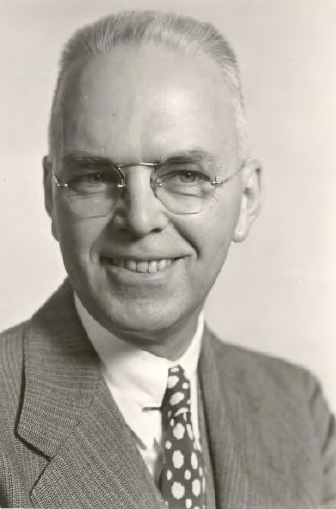 Mr. Arwed C. Baltzer was born in St. Louis, Missouri, April 7, 1894, and died of a heart attack in East Lansing, Michigan, February 1, 1955, aged 60 years, 9 months and 24 days. Mr. Baltzer graduated from the University of Missouri in 1915. Majoring in dairy husbandry, he was inspired undoubtedly by the leadership and teaching of Dr. C. H. Eckles, head of the department during his undergraduate days. At any rate, work—good work and long hours were his forte. Following graduation he was commissioned lieutenant in the United States army in which capacity he served in the AEF, France and the Army of Occupation, Germany, 1918-1919. Back to civilian life, he resumed his interest in dairying by joining the Dairy Department staff, Purdue University, Lafayette, Indiana. In 1921, he came to Michigan State University Extension Service where he served Michigan dairy interests for the next 33 years, one third of a century. Mr. Baltzer was instrumental n the establishment of the Dairy Herd Improvement Association and has worked on various other programs, including eradication of the tuberculosis in cattle, alfalfa campaigns and bull calf placement. He is credited with assisting in the development and planning of the introduction of the new breed of dairy cattle, Red Danish, into the United States and organizing the American Red Danish Cattle Association. Mr. Baltzer was also the author of many journal and magazine articles. He was a member of the Dairy Industry Committee, the American Dairy Association, the American Dairy Science Association and the Governor’s Committee on Dairy in 1943. Few people have left a monument to their life’s work as has “Ace” Baltzer, as he was popularly called. The Michigan Artificial Breeders Association with its study of more than 80 bulls of the major dairy breeds, a complete semen processing laboratory and a record unit of South Campus was his final dream and obsession. Organized in 1943 with four local ABA units, the MABC now has over 125 locals with thousands of farmer members and over 190,000 cows from every section of the commonwealth of Michigan.
Mr. Arwed C. Baltzer was born in St. Louis, Missouri, April 7, 1894, and died of a heart attack in East Lansing, Michigan, February 1, 1955, aged 60 years, 9 months and 24 days. Mr. Baltzer graduated from the University of Missouri in 1915. Majoring in dairy husbandry, he was inspired undoubtedly by the leadership and teaching of Dr. C. H. Eckles, head of the department during his undergraduate days. At any rate, work—good work and long hours were his forte. Following graduation he was commissioned lieutenant in the United States army in which capacity he served in the AEF, France and the Army of Occupation, Germany, 1918-1919. Back to civilian life, he resumed his interest in dairying by joining the Dairy Department staff, Purdue University, Lafayette, Indiana. In 1921, he came to Michigan State University Extension Service where he served Michigan dairy interests for the next 33 years, one third of a century. Mr. Baltzer was instrumental n the establishment of the Dairy Herd Improvement Association and has worked on various other programs, including eradication of the tuberculosis in cattle, alfalfa campaigns and bull calf placement. He is credited with assisting in the development and planning of the introduction of the new breed of dairy cattle, Red Danish, into the United States and organizing the American Red Danish Cattle Association. Mr. Baltzer was also the author of many journal and magazine articles. He was a member of the Dairy Industry Committee, the American Dairy Association, the American Dairy Science Association and the Governor’s Committee on Dairy in 1943. Few people have left a monument to their life’s work as has “Ace” Baltzer, as he was popularly called. The Michigan Artificial Breeders Association with its study of more than 80 bulls of the major dairy breeds, a complete semen processing laboratory and a record unit of South Campus was his final dream and obsession. Organized in 1943 with four local ABA units, the MABC now has over 125 locals with thousands of farmer members and over 190,000 cows from every section of the commonwealth of Michigan.
BERNIE F. BEACH
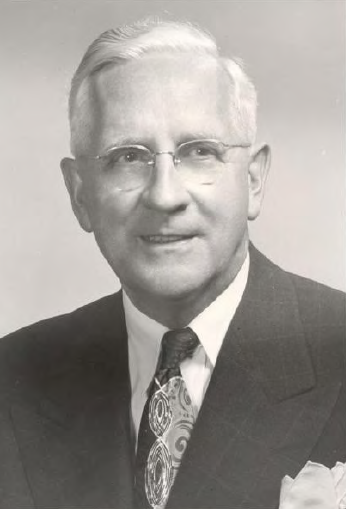 Mr. Bernie F. Beach was born November 28, 1891, on a dairy farm in Tuscola County, Michigan. Upon graduation from Millington High School, Millington, Michigan, he taught in a district school for three years and then entered Michigan State University, College of Agriculture, majoring in dairy manufacturing. Upon graduation from Michigan State University, 1915, Mr. Beach became an agricultural teacher and coach at Hart, Michigan. This experience led him to accept a position as Agricultural Agent for Oceana County, Michigan. After of and one-half years in this work, his market development success was such that he became business manager of the Oakland County Farm Bureau for two years. Continuing on market work, he then became assistant to the president of the Michigan Milk Producers’ Association with headquarters in Detroit, Michigan. Of the nineteen years Mr. Beach was with the Michigan Milk Producers’ Association, the last 12 years were spent in the position of Secretary-Manager of the Association. Mr. Beach resigned from this position to accept the position of General Manager of the Michigan Producers Dairy Company, Adrian, Michigan. He has been in this position for the last sixteen years. The Michigan Producers Dairy Company is a farmer cooperative primarily engaged in the manufacturing of all dairy products excepting hard cheese and evaporated milk. During all these active years, Mr. Beach found time also to serve state, national and international dairy interests. A list of the many offices held honors bestowed upon him, and they include: Director, National Dairy Council, 10 years; Vice President, National Dairy Council, 3 years; Director, American Dry Mild Institute, 12 years; Chairman of the Board of Directors, 4 years; Chairman and vice chairman, Dairy Industry Committee, 4 years; President, Dairy Society International, 1957; Appointed by the secretary of Agriculture, 1954, to represent dairy industry on a trade mission to Southern Europe. Also appointed to Export Advisory Committee; Dairy consultant to Puerto Rico, 1955, 1956; Member, Board of Trustees, Adrian College; Past president, Adrian Chamber of Commerce; Co-Chairman, Industrial Committee, Adrian Community Chest; Member, Board of Directors, Band of Lenawee County, since 1943; Recipient, Michigan State University Dairy Manufacturers Award, 1955, for his contributions to the dairy industry of Michigan; Named “man of the year” by Adrian Chamber of Commerce, 1955; and Sent as chairman of three-man dairy consultant team to Chile, 1957, by Dairy Society International and Foreign Agricultural Service, U.S.D.A.
Mr. Bernie F. Beach was born November 28, 1891, on a dairy farm in Tuscola County, Michigan. Upon graduation from Millington High School, Millington, Michigan, he taught in a district school for three years and then entered Michigan State University, College of Agriculture, majoring in dairy manufacturing. Upon graduation from Michigan State University, 1915, Mr. Beach became an agricultural teacher and coach at Hart, Michigan. This experience led him to accept a position as Agricultural Agent for Oceana County, Michigan. After of and one-half years in this work, his market development success was such that he became business manager of the Oakland County Farm Bureau for two years. Continuing on market work, he then became assistant to the president of the Michigan Milk Producers’ Association with headquarters in Detroit, Michigan. Of the nineteen years Mr. Beach was with the Michigan Milk Producers’ Association, the last 12 years were spent in the position of Secretary-Manager of the Association. Mr. Beach resigned from this position to accept the position of General Manager of the Michigan Producers Dairy Company, Adrian, Michigan. He has been in this position for the last sixteen years. The Michigan Producers Dairy Company is a farmer cooperative primarily engaged in the manufacturing of all dairy products excepting hard cheese and evaporated milk. During all these active years, Mr. Beach found time also to serve state, national and international dairy interests. A list of the many offices held honors bestowed upon him, and they include: Director, National Dairy Council, 10 years; Vice President, National Dairy Council, 3 years; Director, American Dry Mild Institute, 12 years; Chairman of the Board of Directors, 4 years; Chairman and vice chairman, Dairy Industry Committee, 4 years; President, Dairy Society International, 1957; Appointed by the secretary of Agriculture, 1954, to represent dairy industry on a trade mission to Southern Europe. Also appointed to Export Advisory Committee; Dairy consultant to Puerto Rico, 1955, 1956; Member, Board of Trustees, Adrian College; Past president, Adrian Chamber of Commerce; Co-Chairman, Industrial Committee, Adrian Community Chest; Member, Board of Directors, Band of Lenawee County, since 1943; Recipient, Michigan State University Dairy Manufacturers Award, 1955, for his contributions to the dairy industry of Michigan; Named “man of the year” by Adrian Chamber of Commerce, 1955; and Sent as chairman of three-man dairy consultant team to Chile, 1957, by Dairy Society International and Foreign Agricultural Service, U.S.D.A.
CLARENCE A. BRODY
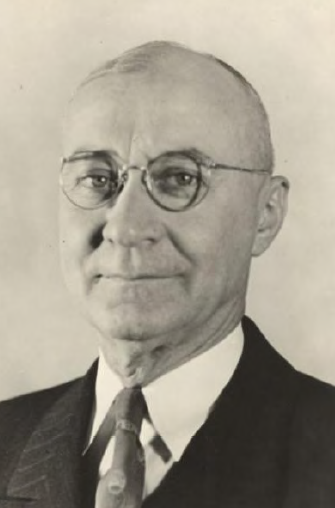 Mr. Clarence A. Brody was born February 2, 1882, in Fabius Township, St. Joseph County, Michigan. He passed away July 19th, 1942, in Constantine Michigan, aged 60 years, five months, and 17 days. While his entire life was spent in his native St. Joseph County, his activities and influence extended far beyond county lines. Mr. Brody was one of the founders of the Constantine Cooperative Creamery Company. From its founding in 1915 to the time of his death in 1942, 27 year, he was a member of the board of directors, secretary-treasurer and manager of this creamery. Truly, the Constantine Cooperative Creamery Company was to become his life monument. Mr. Brody was a man of accomplishments with visions and understanding. He saw the economic advantages of gathering cream at the farm—not having the individual producers delivering it to the creamery. Thus, the introduction of cream routes relived the farmer of this task. At the same time, the creamery was assured of a higher quality raw product for manufacture into butter. Likewise, he sensed the economies and possibilities of mass production of butter to meet the growing demand. Few understood the problems both of the farmer and of the consumer as did Mr. Brody. His keen, sympathetic, understanding of human nature enabled him to form friendships without number. This is reflected by the positions of responsibility thrust upon him. He served as president of the Midwest Producer’s Creameries, Inc., and as director of the following institutions: First Commercial Savings Bank; the Constantine Cooperative, Inc,; National Milk Producers Federation; Dairy Products Marketing Association; Michigan Creamery Owners and Managers Association; and Michigan Allied Dairy Association.
Mr. Clarence A. Brody was born February 2, 1882, in Fabius Township, St. Joseph County, Michigan. He passed away July 19th, 1942, in Constantine Michigan, aged 60 years, five months, and 17 days. While his entire life was spent in his native St. Joseph County, his activities and influence extended far beyond county lines. Mr. Brody was one of the founders of the Constantine Cooperative Creamery Company. From its founding in 1915 to the time of his death in 1942, 27 year, he was a member of the board of directors, secretary-treasurer and manager of this creamery. Truly, the Constantine Cooperative Creamery Company was to become his life monument. Mr. Brody was a man of accomplishments with visions and understanding. He saw the economic advantages of gathering cream at the farm—not having the individual producers delivering it to the creamery. Thus, the introduction of cream routes relived the farmer of this task. At the same time, the creamery was assured of a higher quality raw product for manufacture into butter. Likewise, he sensed the economies and possibilities of mass production of butter to meet the growing demand. Few understood the problems both of the farmer and of the consumer as did Mr. Brody. His keen, sympathetic, understanding of human nature enabled him to form friendships without number. This is reflected by the positions of responsibility thrust upon him. He served as president of the Midwest Producer’s Creameries, Inc., and as director of the following institutions: First Commercial Savings Bank; the Constantine Cooperative, Inc,; National Milk Producers Federation; Dairy Products Marketing Association; Michigan Creamery Owners and Managers Association; and Michigan Allied Dairy Association.
TURNER HAROLD BROUGHTON
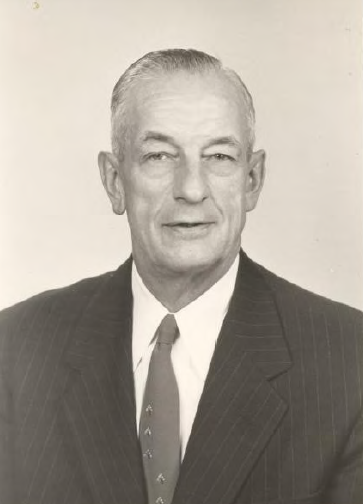 Mr. Turner Harold Broughton was born May 21, 1892, in Franklin, Michigan. He grew up on his father’s dairy, livestock and fruit farm in Oakland County, near Birmingham, which he has owned, in part, and operated since 1935.
Mr. Turner Harold Broughton was born May 21, 1892, in Franklin, Michigan. He grew up on his father’s dairy, livestock and fruit farm in Oakland County, near Birmingham, which he has owned, in part, and operated since 1935.
His early training, college education and varied job experiences fitted him admirably for the dairy leadership which the industry has demanded of him for over a quarter of a century. Immediately upon graduation from the College of Agriculture, Michigan State University, 1915, where he majored in dairy husbandry, he became Chief Dairy and Food Inspector, City of Jackson. He served the inspection service there until February 1917, when he accepted a position at the Purdue University Agriculture Experiment Station, Lafayette, Indiana, in charge of the Creamery License Division. From December 1921 to May 1932, Mr. Broughton was Director, Bureau of Dairying, Michigan Department of Agriculture. Since then, he has been manager, Michigan Milk Bottle Exchange, Detroit. The food inspection service at Jackson and the five years at Purdue apprenticed him for the role he was called upon to play later in forming, directing and guiding dairy legislation in Michigan. Few men have withstood the abuse, brunt and personal attacks, often incident to the enactment of dairy legislation, and yet commanded full respect of proponents and opponents alike as has Turner H. Broughton during his lifetime of service to Michigan Dairying. A list of his activities, responsibilities and honors attests to the confidence placed upon him by the dairy industry. These are: Director, Bureau of Dairying, Michigan Department of Agriculture, Lansing, December 1921 to May 1932; Manager, Michigan Milk Bottle Exchange, Detroit, since May 1932; President, Dairy Container Corporation, Detroit, since 1937; Treasurer, President, Michigan Allied Dairy Association, since 1938; 1943 and 1935; President, Michigan Milk Dealers Association, 1952 and 1953; Treasurer, Michigan Association of Ice Cream Manufacturers, since 1950; and Received the second annual Michigan State University Dairy Manufactures Award, November 3, 1954.
GUVARIE S. COFFMAN
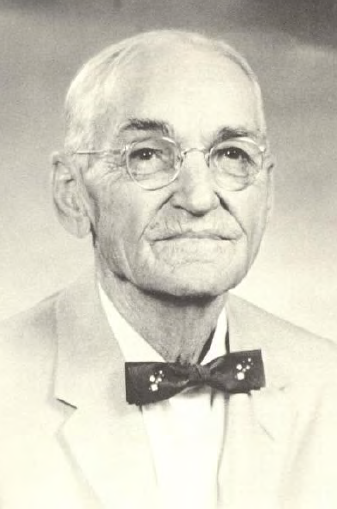 Mr. Guvarie S. Coffman was born July 8, 1874, on a farm in Branch County, Michigan. His basic country school training and two years of high school enabled him to earn a teachers certificate. However, other vocations were to claim his service. As a cabinet maker, lumber dealer, farmer, creamery manager, defender of small business, promoter of cooperative marketing and citizen, Mr. Coffman served Branch County long and well. Through have a purebred Guernsey herd in the Dairy Improvement Association for 36 years, he demonstrated his belief in the importance of the farmer keeping milk production records. With pride, he could point out that from 1929 to 1939 one of his Guernsey cows produced 5,422 pounds of butterfat. He believed in good purebred stock maintaining both a herd of Guernsey cows and of spotted Poland China hogs. Mr. Coffman was highly cooperative-minded. In 1924, he helped to reorganize the Coldwater Dairy Company and operated it from February 1924 to August 1953. This was the first cooperative organized in Michigan as a strictly producer-owned revolving stock company. During the 29 ½ years he served as manager, the company was able to pay the producer-owners $600,000 extra. In 1934, as chairman of the Michigan group, Mr. Coffman helped to organize the Michigan Cooperative Creameries. Within 18 months, this organization merged with creamery organizations in other states to form the Mid-West Producers Creameries, South Bend, Indiana. Mr. Coffman was a man of courage and conviction. Marketing his products directly to the Detroit markets, he soon confronted with a City of Detroit $100 per-truck, itinerant, license fee signed by Mayor Frank Murphy, later Governor of Michigan, and justice of the United States Supreme Court. With the aid of a state Farm Bureau attorney, the dairy fought this ruling through the courts where it was thrown out as unconstitutional. Nevertheless, coalition of Detroit jobbers and the Teamster’s Union resulted in dire warnings to Coldwater Dairy drivers to stay out of Detroit. Mr. Coffman circumvented violence by shipping his products to Detroit retailers by express. Interestingly, he sold to the five U.A.W.-C.I.O stores opened by Walter and Victor Reuther, of which Victor Reuther was manager. During his trouble, Mr. Coffman personally was threatened twice. Recalling these experiences he states: “My thinking of this is that the most undesirable citizen we have in the United States today is the fellow who tries to make a living by hiring out to threaten people who are willing to work.”
Mr. Guvarie S. Coffman was born July 8, 1874, on a farm in Branch County, Michigan. His basic country school training and two years of high school enabled him to earn a teachers certificate. However, other vocations were to claim his service. As a cabinet maker, lumber dealer, farmer, creamery manager, defender of small business, promoter of cooperative marketing and citizen, Mr. Coffman served Branch County long and well. Through have a purebred Guernsey herd in the Dairy Improvement Association for 36 years, he demonstrated his belief in the importance of the farmer keeping milk production records. With pride, he could point out that from 1929 to 1939 one of his Guernsey cows produced 5,422 pounds of butterfat. He believed in good purebred stock maintaining both a herd of Guernsey cows and of spotted Poland China hogs. Mr. Coffman was highly cooperative-minded. In 1924, he helped to reorganize the Coldwater Dairy Company and operated it from February 1924 to August 1953. This was the first cooperative organized in Michigan as a strictly producer-owned revolving stock company. During the 29 ½ years he served as manager, the company was able to pay the producer-owners $600,000 extra. In 1934, as chairman of the Michigan group, Mr. Coffman helped to organize the Michigan Cooperative Creameries. Within 18 months, this organization merged with creamery organizations in other states to form the Mid-West Producers Creameries, South Bend, Indiana. Mr. Coffman was a man of courage and conviction. Marketing his products directly to the Detroit markets, he soon confronted with a City of Detroit $100 per-truck, itinerant, license fee signed by Mayor Frank Murphy, later Governor of Michigan, and justice of the United States Supreme Court. With the aid of a state Farm Bureau attorney, the dairy fought this ruling through the courts where it was thrown out as unconstitutional. Nevertheless, coalition of Detroit jobbers and the Teamster’s Union resulted in dire warnings to Coldwater Dairy drivers to stay out of Detroit. Mr. Coffman circumvented violence by shipping his products to Detroit retailers by express. Interestingly, he sold to the five U.A.W.-C.I.O stores opened by Walter and Victor Reuther, of which Victor Reuther was manager. During his trouble, Mr. Coffman personally was threatened twice. Recalling these experiences he states: “My thinking of this is that the most undesirable citizen we have in the United States today is the fellow who tries to make a living by hiring out to threaten people who are willing to work.”
LEONARD NERRETER FRANCKE
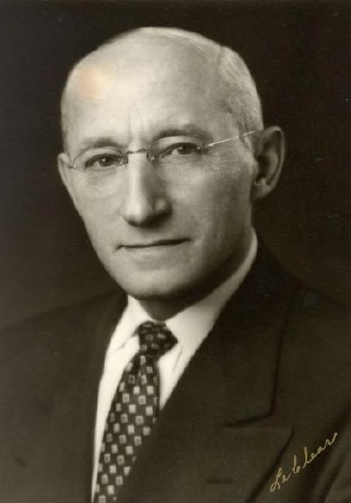 Mr. Francke’s biography is best contained in the citation on the occasion of his being named posthumously as Michigan Dairyman for 1958, November 1958. The citation follows: “Few men have had longer association with the dairy industry than Leonard Nerreter Francke, executive secretary of the Michigan Allied Dairy Association. He was a son of Mr. E. D. Francke, pioneer ice cream manufacturer of Saginaw and when old enough, was made a partner in the firm E. D. Francke and Sons. “During the early years of his business life, while working in the home plant, he became concerned with promotion of Michigan’s ice cream industry and was epically active in writing the first definitive ice cream law in this country 1930-31. The act became effective in 1932 and the acclaim it received made Mr. Francke the logical choice for secretary of the Michigan Ice Cream Manufacturers’ Association. Shortly thereafter, the secretary ship of the Michigan Milk Dealers’ Association and the Michigan Allied Dairy Association were added to his duties. He was extremely successful in handling multifold problems of this office which has been a source of pride to his friends and satisfaction to his family. “His frequent reports to his clientele were remarkable for their clarity and interpretation, but probably his greatest talent lay in his legal ability, and this, despite his deprivation in his youth of a complete high school education, which he completed in his later years. He was not only instrumental in the passage of the ice cream law, but also of the laws for compulsory milk pasteurization, bulk milk tank legislation, milk processing, Grade A definition, and the regulations supplementing these laws. “At the time of his death, Mr. Francke was vice president of the National Association of Secretaries. Locally, he was member of and took especial pride in his membership in the Capital Club. Annually, he was the director of the Michigan Allied Dairy Convention, which attracted large numbers of people in the dairy industry. “Personally, his qualities of affability, capability, loyalty to the industry and the public, his community spirit and friendliness earned him the abiding respect of all. To commemorate his many achievements, this citation of merit is being awarded as a testimonial by the faculty of the Department of Dairy, Michigan State University.”
Mr. Francke’s biography is best contained in the citation on the occasion of his being named posthumously as Michigan Dairyman for 1958, November 1958. The citation follows: “Few men have had longer association with the dairy industry than Leonard Nerreter Francke, executive secretary of the Michigan Allied Dairy Association. He was a son of Mr. E. D. Francke, pioneer ice cream manufacturer of Saginaw and when old enough, was made a partner in the firm E. D. Francke and Sons. “During the early years of his business life, while working in the home plant, he became concerned with promotion of Michigan’s ice cream industry and was epically active in writing the first definitive ice cream law in this country 1930-31. The act became effective in 1932 and the acclaim it received made Mr. Francke the logical choice for secretary of the Michigan Ice Cream Manufacturers’ Association. Shortly thereafter, the secretary ship of the Michigan Milk Dealers’ Association and the Michigan Allied Dairy Association were added to his duties. He was extremely successful in handling multifold problems of this office which has been a source of pride to his friends and satisfaction to his family. “His frequent reports to his clientele were remarkable for their clarity and interpretation, but probably his greatest talent lay in his legal ability, and this, despite his deprivation in his youth of a complete high school education, which he completed in his later years. He was not only instrumental in the passage of the ice cream law, but also of the laws for compulsory milk pasteurization, bulk milk tank legislation, milk processing, Grade A definition, and the regulations supplementing these laws. “At the time of his death, Mr. Francke was vice president of the National Association of Secretaries. Locally, he was member of and took especial pride in his membership in the Capital Club. Annually, he was the director of the Michigan Allied Dairy Convention, which attracted large numbers of people in the dairy industry. “Personally, his qualities of affability, capability, loyalty to the industry and the public, his community spirit and friendliness earned him the abiding respect of all. To commemorate his many achievements, this citation of merit is being awarded as a testimonial by the faculty of the Department of Dairy, Michigan State University.”
JAMES G. HAYS
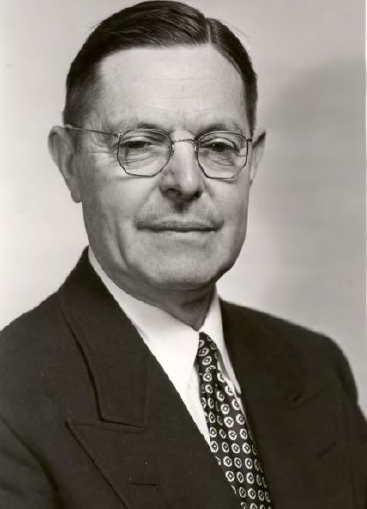 Mr. James G. Hays was born in Pittsburgh, Pennsylvania, June 11, 1890. Early in life he came to Michigan and spent his young manhood on a farm near Howell, Livingston County, Michigan. Mr. Hays received the Bachelor of Science degree from Michigan State University, then Michigan Agricultural College in 1911. Following graduation, he followed dairy farming on his farm east of Howell, Michigan until 1922, when he joined the dairy extension staff of his alma mater. Here he served for 33 years, a third of a century, until his retirement July 1, 1955. Mr. Hays was noted for his cooperative spirit, earnestness of purpose and meticulous detail in effecting programs. Educational programs of which he was a part throughout the state contributed greatly to the development of the dairy industry. Some major activities were: a) encouraging the use of herd sires that would improve the dairy herds; b) growing more alfalfa to feed the dairy herd; and c) conducting the over-all dairy feeding phase of the extension program. For several years during the war, Mr. Hays worked in the Emergency Farm Labor office of the university extension service to help farmers secure needed laborers. In 1946, he directed the Rural Progressive Caravan, which visited lower Michigan counties. In addition to his regular work in dairy extension, Mr. Hays is widely known throughout the state and nation as a humorous and entertaining speaker. Thousands of people—farmers, bankers, lawyers, teachers, have heard Jim’s unique philosophy on “The Ideal Cow.” All remunerations for these extra speaking engagements have been used either to build up a Student Loan Fund, which was started by student friends of “Jimmie Hays, III,” who graduated from Michigan State University in 1983 and died a short time later, to help found the Alumni Memorial Chapel, or to add to the scholarship started in Mr. Hays’ name by the Michigan Dairy Memorial and Scholarship Foundation, Inc. He holds membership in several national organizations, among them the Holstein-Friesian Association of America and the American Dairy Science Association. He is a charter member of the Michigan Milk Producers’ Association and a life member of the Michigan Farm Bureau. At graduation ceremonies in 1958, Mr. Hays was awarded the “Alumni Award for Distinguished Service.”
Mr. James G. Hays was born in Pittsburgh, Pennsylvania, June 11, 1890. Early in life he came to Michigan and spent his young manhood on a farm near Howell, Livingston County, Michigan. Mr. Hays received the Bachelor of Science degree from Michigan State University, then Michigan Agricultural College in 1911. Following graduation, he followed dairy farming on his farm east of Howell, Michigan until 1922, when he joined the dairy extension staff of his alma mater. Here he served for 33 years, a third of a century, until his retirement July 1, 1955. Mr. Hays was noted for his cooperative spirit, earnestness of purpose and meticulous detail in effecting programs. Educational programs of which he was a part throughout the state contributed greatly to the development of the dairy industry. Some major activities were: a) encouraging the use of herd sires that would improve the dairy herds; b) growing more alfalfa to feed the dairy herd; and c) conducting the over-all dairy feeding phase of the extension program. For several years during the war, Mr. Hays worked in the Emergency Farm Labor office of the university extension service to help farmers secure needed laborers. In 1946, he directed the Rural Progressive Caravan, which visited lower Michigan counties. In addition to his regular work in dairy extension, Mr. Hays is widely known throughout the state and nation as a humorous and entertaining speaker. Thousands of people—farmers, bankers, lawyers, teachers, have heard Jim’s unique philosophy on “The Ideal Cow.” All remunerations for these extra speaking engagements have been used either to build up a Student Loan Fund, which was started by student friends of “Jimmie Hays, III,” who graduated from Michigan State University in 1983 and died a short time later, to help found the Alumni Memorial Chapel, or to add to the scholarship started in Mr. Hays’ name by the Michigan Dairy Memorial and Scholarship Foundation, Inc. He holds membership in several national organizations, among them the Holstein-Friesian Association of America and the American Dairy Science Association. He is a charter member of the Michigan Milk Producers’ Association and a life member of the Michigan Farm Bureau. At graduation ceremonies in 1958, Mr. Hays was awarded the “Alumni Award for Distinguished Service.”
NATHAN P. HULL
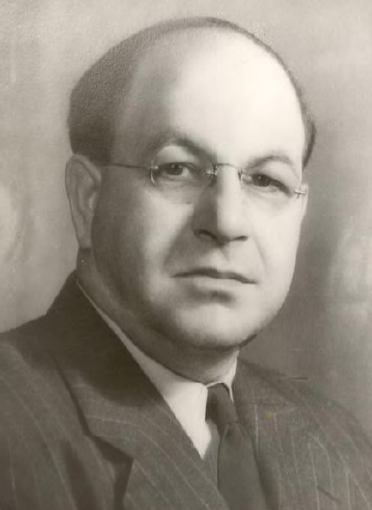 Nathan P. Hull was one of the founders and the first President of Michigan Milk Producers Association. Born on a farm in Windsor Township, Eaton County, Mr. Hull and a brother, John, worked the place practically from childhood. He attended Michigan Agricultural College in 1889-90. Mr. Hull was elected Overseer of the Michigan State Grange in 1900, and from that time forward was intensely active in farm activities in Michigan and nationally. He was named Master of the State Grange in 1908. An outstanding platform orator, he became Lecturer of the National Grange in 1911. His speaking abilities made him much in demand at farmers’ institutes. In 1912 he was made secretary of the National Dairy Union. He was instrumental in developing Michigan Department of Agriculture dairy policies in the early years of the 20th century, and was elected to the presidency of the Michigan Mild Producers Association in 1916. He served in this capacity until 1936. In 1933, Mr. Hull was elected president of the National Milk Producers Federation and served many years in the post. Despite his many activities in public life and as a businessman, Mr. Hull’s chief business interest was farming. With other members of his family, he maintained the family homestead and enlarged it to 400 acres by 1936. The farm specialized in Holstein-Friesian cows and Hampshire sheep. Mr. Hull received an honorary Doctor of Agriculture degree from Michigan State College in 1948. He continued active in national, state and local farm organizations long after his retirements as MMPA President. He also continued to serve as director of several financial institutions until shortly before his death. Mr. Hull was survived by one son, John W., a brother and sister, and five grandchildren. Mr. Hull was a true pioneer in dairy farmer organization, and he was an articulate spokesman for the advancement of dairy farmers in Michigan.
Nathan P. Hull was one of the founders and the first President of Michigan Milk Producers Association. Born on a farm in Windsor Township, Eaton County, Mr. Hull and a brother, John, worked the place practically from childhood. He attended Michigan Agricultural College in 1889-90. Mr. Hull was elected Overseer of the Michigan State Grange in 1900, and from that time forward was intensely active in farm activities in Michigan and nationally. He was named Master of the State Grange in 1908. An outstanding platform orator, he became Lecturer of the National Grange in 1911. His speaking abilities made him much in demand at farmers’ institutes. In 1912 he was made secretary of the National Dairy Union. He was instrumental in developing Michigan Department of Agriculture dairy policies in the early years of the 20th century, and was elected to the presidency of the Michigan Mild Producers Association in 1916. He served in this capacity until 1936. In 1933, Mr. Hull was elected president of the National Milk Producers Federation and served many years in the post. Despite his many activities in public life and as a businessman, Mr. Hull’s chief business interest was farming. With other members of his family, he maintained the family homestead and enlarged it to 400 acres by 1936. The farm specialized in Holstein-Friesian cows and Hampshire sheep. Mr. Hull received an honorary Doctor of Agriculture degree from Michigan State College in 1948. He continued active in national, state and local farm organizations long after his retirements as MMPA President. He also continued to serve as director of several financial institutions until shortly before his death. Mr. Hull was survived by one son, John W., a brother and sister, and five grandchildren. Mr. Hull was a true pioneer in dairy farmer organization, and he was an articulate spokesman for the advancement of dairy farmers in Michigan.
PETER JOPPE
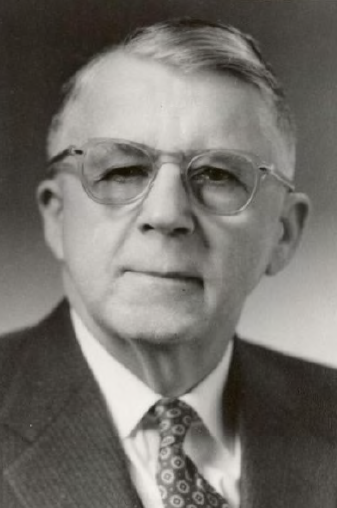 Mr. Peter Joppe was born on a farm on the Island of Flakke, The Netherlands, in 1893. One of a family of nine children, he early learned to work. In 1910, at the early age of 17 years, he emigrated to the United States, where he obtained work on the Buth Brothers (Jon and Peter) farm north of Comstock Park, a suburb of Grand Rapids, Michigan. In 1913, Mr. Joppe, now 20 years old, ventured into the dairy business. He left the farm to become a partner with Theodore Groothhof in operating the Furniture City Dairy Company, which was located at the corner of Wealthy Street and Fuller Avenue, Grand Rapids. Two years later, in 1915, he disposed of his interest in the Furniture City Dairy Company and purchased the Woodside Dairy at 2324 Division Avenue, South, Grand Rapids, changing the name to Joppe’s Dairy Company. In the same year, he married Jennie Van Prooyen, also a native of The Netherlands. The operations of Joppe’s Dairy Company grew steadily. Several times it became necessary to enlarge the plant at 2324 Division Avenue. The continued growth of the Joppe’s Dairy Company soon forced the breaking of ground for a new plant located at 900 Division Avenue, the present hope of the Joppe’s Dairy Company. Work on the new plant was started in 1948 with the building of a modern garage to house the automotive equipment, which by then had replaced the horse drawn vehicles. Two years later, in 1950, actual work was started on the processing plant and office, which was completed early in 1952. Since that time, there has been a constant expansion program, both as to building and modernization of plant equipment, until today, as in 1952, the Joppe’s Dairy Company processing plant is one of the most modern in the United States. Mr. Joppe’s accomplishments are many. Mr. Joppe was one of the organizers of the Grand Rapids Bottle Exchange. He was its vice president in 1930 and 1931. In 1932, he was elected president and held this office through 1943. For several years he was the vice president of the Grand Rapids Milk Dealers Association. Because of his closeness and keep interest in the dairy industry, he has held that position ever since—26 years. Meanwhile, he did double duty by serving a term as president of this association. He was s director of the National Retail Ice Cream Manufacturers Association for two years. He served creditably on former Governor Frank Murphy’s Milk Marketing Study Commission. He was one of the originators of, and the first president of the Michigan Dairy Memorial and Scholarship Foundation, Inc. Few men in the dairy industry have excelled Peter Joppe in gaining the confidence and respect of dairy workers throughout Michigan and America. His accomplishments are indeed a challenge to all young men.
Mr. Peter Joppe was born on a farm on the Island of Flakke, The Netherlands, in 1893. One of a family of nine children, he early learned to work. In 1910, at the early age of 17 years, he emigrated to the United States, where he obtained work on the Buth Brothers (Jon and Peter) farm north of Comstock Park, a suburb of Grand Rapids, Michigan. In 1913, Mr. Joppe, now 20 years old, ventured into the dairy business. He left the farm to become a partner with Theodore Groothhof in operating the Furniture City Dairy Company, which was located at the corner of Wealthy Street and Fuller Avenue, Grand Rapids. Two years later, in 1915, he disposed of his interest in the Furniture City Dairy Company and purchased the Woodside Dairy at 2324 Division Avenue, South, Grand Rapids, changing the name to Joppe’s Dairy Company. In the same year, he married Jennie Van Prooyen, also a native of The Netherlands. The operations of Joppe’s Dairy Company grew steadily. Several times it became necessary to enlarge the plant at 2324 Division Avenue. The continued growth of the Joppe’s Dairy Company soon forced the breaking of ground for a new plant located at 900 Division Avenue, the present hope of the Joppe’s Dairy Company. Work on the new plant was started in 1948 with the building of a modern garage to house the automotive equipment, which by then had replaced the horse drawn vehicles. Two years later, in 1950, actual work was started on the processing plant and office, which was completed early in 1952. Since that time, there has been a constant expansion program, both as to building and modernization of plant equipment, until today, as in 1952, the Joppe’s Dairy Company processing plant is one of the most modern in the United States. Mr. Joppe’s accomplishments are many. Mr. Joppe was one of the organizers of the Grand Rapids Bottle Exchange. He was its vice president in 1930 and 1931. In 1932, he was elected president and held this office through 1943. For several years he was the vice president of the Grand Rapids Milk Dealers Association. Because of his closeness and keep interest in the dairy industry, he has held that position ever since—26 years. Meanwhile, he did double duty by serving a term as president of this association. He was s director of the National Retail Ice Cream Manufacturers Association for two years. He served creditably on former Governor Frank Murphy’s Milk Marketing Study Commission. He was one of the originators of, and the first president of the Michigan Dairy Memorial and Scholarship Foundation, Inc. Few men in the dairy industry have excelled Peter Joppe in gaining the confidence and respect of dairy workers throughout Michigan and America. His accomplishments are indeed a challenge to all young men.
J. NEAL LAMOREAUX
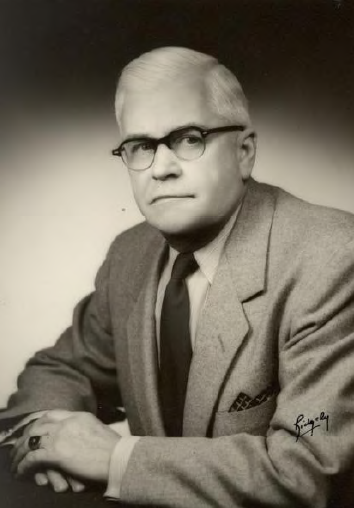 Mr. J. Neal Lamoreaux was born May 3, 1890, on a farm near Mill Creek, Michigan, later known as Comstock Park. Here he lived his entire life on the family homestead. He died of a heart attack February 6, 1954, aged 63 years, 9 months and 3 days. Mr. Lamoreaux attended school in Comstock Park and was graduated from the old McLachlin Business College. During his 64 years, he was destined to become a leader of note. As farmer, businessman, Michigan State Senator, public servant and loyal dairy crusader, he crowded much into his three score and four years. In 1914, he established the Comstock Ice and Fuel Company. However, his real business interests were with dairy farming and with the processing and distribution of milk. He was always alert to the rapidly changing methods of milk marketing. Modernizing his operations, he kept pace with progress. Thereby, in his several spheres of public service he could speak authoritatively and convincingly on milk problems. As chairman of the first State Agricultural Commission, 1945, Mr. Lamoreaux directed its activities so effectively on a high plane that seemingly, this organization commanded respect and attained stature from its very inception. Mr. Lamoreaux’s long list of public service includes: President, Grand Rapids Milk Dealers Association, 20 years; Director, Grand Rapids Milk Bottle Exchange; Michigan State Senator, two terms, 1932 to 1934 and 1936 to 1938; Member, Michigan electorate, 1933, to name Franklin D. Roosevelt president of the United States; President, Grand Rapids Old Settlers Association, 2 years; President, Comstock Park School Board; and President, Comstock Park Improvement Association.
Mr. J. Neal Lamoreaux was born May 3, 1890, on a farm near Mill Creek, Michigan, later known as Comstock Park. Here he lived his entire life on the family homestead. He died of a heart attack February 6, 1954, aged 63 years, 9 months and 3 days. Mr. Lamoreaux attended school in Comstock Park and was graduated from the old McLachlin Business College. During his 64 years, he was destined to become a leader of note. As farmer, businessman, Michigan State Senator, public servant and loyal dairy crusader, he crowded much into his three score and four years. In 1914, he established the Comstock Ice and Fuel Company. However, his real business interests were with dairy farming and with the processing and distribution of milk. He was always alert to the rapidly changing methods of milk marketing. Modernizing his operations, he kept pace with progress. Thereby, in his several spheres of public service he could speak authoritatively and convincingly on milk problems. As chairman of the first State Agricultural Commission, 1945, Mr. Lamoreaux directed its activities so effectively on a high plane that seemingly, this organization commanded respect and attained stature from its very inception. Mr. Lamoreaux’s long list of public service includes: President, Grand Rapids Milk Dealers Association, 20 years; Director, Grand Rapids Milk Bottle Exchange; Michigan State Senator, two terms, 1932 to 1934 and 1936 to 1938; Member, Michigan electorate, 1933, to name Franklin D. Roosevelt president of the United States; President, Grand Rapids Old Settlers Association, 2 years; President, Comstock Park School Board; and President, Comstock Park Improvement Association.
R. FREDERICK LOCKE
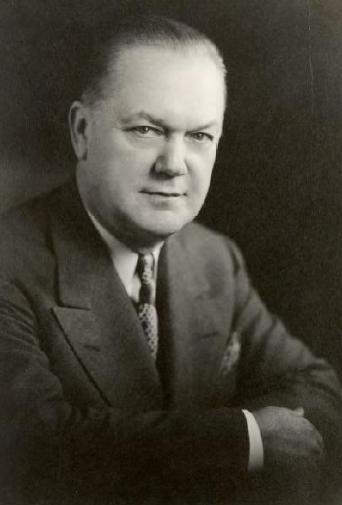 R. Frederick Locke, son of Joseph and Helen Bradfield Locke, was born at Capac, Michigan, January 27, 1879, and passed away at the age of 81 at the Borgess Hospital, Kalamazoo, February 3, 1960. Mr. Locke had an envied career. Graduation from the Capac High School in 1897, he began an association with railroading which lasted over three-score years, and which saw him raised to the presidency and vice presidency of several associations closely allied with freight transportation. In 1920, he was President of the Universal Car loading Distributing Company. Later, in 1925 he became Senior Vice President of the Nicholson Universal Steamship Company. Four years later, 1929, he was elected President of the National Car Loading Company. From 1934 to 1958, a quarter of a century, he served as Vice President of the Acme Fast Freight, Inc. Few men during a lifetime play distinctive roles in two major fields. R. Frederick Locke was one of them. Not only was he a leader in the realm of railroading, particularly in fast freight transportation, but created, through genuine love for Guernsey, a most favorable relationship with the American Guernsey Cattle Club and honor to the dairy industry as well. In 1925, Mr. Locke purchased a Michigan farm near Kalamazoo, which was destined to become known nationally as “Lockshore Farms.” Here, he became one of the oldest and finest breeders of Guernsey cattle in America, marketing the milk under the name of Golden Guernsey. Lockshore Farms Dairy, Kalamazoo, indeed is a monument to R. Frederick Locke’s love for dairying and belief in the goodness of dairy products. While Mr. Locke lost himself in railroading and dairying, he nevertheless found ample time to take care of civil duties as well. He was affiliated with the Presbyterian Church, member of the Medinah Shrine, Order of Eater Star, and was a member of various other orders of A.F. and A.M. While the passing of Mr. Locke Takes away one of the honored leaders in dairying, his life is being perpetuated in his mature dream, The Lockshore Farms Dairy, now ably managed by his three sons, Philip F., Robert P., and Wendell C., who early caught the spirit of dairying from their eminent father.
R. Frederick Locke, son of Joseph and Helen Bradfield Locke, was born at Capac, Michigan, January 27, 1879, and passed away at the age of 81 at the Borgess Hospital, Kalamazoo, February 3, 1960. Mr. Locke had an envied career. Graduation from the Capac High School in 1897, he began an association with railroading which lasted over three-score years, and which saw him raised to the presidency and vice presidency of several associations closely allied with freight transportation. In 1920, he was President of the Universal Car loading Distributing Company. Later, in 1925 he became Senior Vice President of the Nicholson Universal Steamship Company. Four years later, 1929, he was elected President of the National Car Loading Company. From 1934 to 1958, a quarter of a century, he served as Vice President of the Acme Fast Freight, Inc. Few men during a lifetime play distinctive roles in two major fields. R. Frederick Locke was one of them. Not only was he a leader in the realm of railroading, particularly in fast freight transportation, but created, through genuine love for Guernsey, a most favorable relationship with the American Guernsey Cattle Club and honor to the dairy industry as well. In 1925, Mr. Locke purchased a Michigan farm near Kalamazoo, which was destined to become known nationally as “Lockshore Farms.” Here, he became one of the oldest and finest breeders of Guernsey cattle in America, marketing the milk under the name of Golden Guernsey. Lockshore Farms Dairy, Kalamazoo, indeed is a monument to R. Frederick Locke’s love for dairying and belief in the goodness of dairy products. While Mr. Locke lost himself in railroading and dairying, he nevertheless found ample time to take care of civil duties as well. He was affiliated with the Presbyterian Church, member of the Medinah Shrine, Order of Eater Star, and was a member of various other orders of A.F. and A.M. While the passing of Mr. Locke Takes away one of the honored leaders in dairying, his life is being perpetuated in his mature dream, The Lockshore Farms Dairy, now ably managed by his three sons, Philip F., Robert P., and Wendell C., who early caught the spirit of dairying from their eminent father.
IVAN K. MAYSTEAD
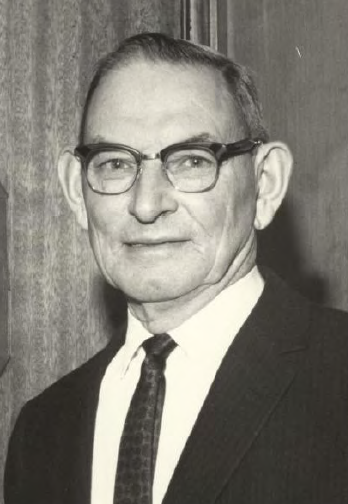 Ivan K. Maystead, third President of the Michigan Milk Producers’ Association also helped organize the Michigan Dairy Memorial Scholarship Foundation. He was President of MMPA during the period of its most rapid growth. First appointed to the Board of Directors in 1934, he subsequently was elected to consecutive terms and became President in 1944. He spent a total of 21 years in top leadership positions with MMPA. In addition to the many years of service to MMPA, Mr. Maystead, a 1915 graduate of Michigan State Agricultural College specializing in soils and crops, devoted much time to other agricultural endeavors. He was an Extensions Service specialist in soils in Hillsdale County; helped organize a cooperative livestock shipping association; served on the board of directors of the Hillsdale Cooperative Association; helped organize the Hillsdale Country Farm Bureau, and served on the board of directors of the Farm Bureau. After becoming an MMPA official, Mr. Maystead helped organize the American Dairy Association of Michigan, and served on its board of directors for 15 years. A founder of the Michigan Agricultural Conference, and its president for two years, he also was an incorporator of the Michigan Dairy Farmers’ Federation and served on its board of directors. Mr. Maystead was a member of the Board of Directors of the National Milk Producers’ Federation, the Michigan Producers’ Dairy Company, and served on the committee which drafted Michigan’s Blueprint for Rural Progress. Mr. Maystead has been recognized as one of the great leaders and counselors of Michigan agriculture.
Ivan K. Maystead, third President of the Michigan Milk Producers’ Association also helped organize the Michigan Dairy Memorial Scholarship Foundation. He was President of MMPA during the period of its most rapid growth. First appointed to the Board of Directors in 1934, he subsequently was elected to consecutive terms and became President in 1944. He spent a total of 21 years in top leadership positions with MMPA. In addition to the many years of service to MMPA, Mr. Maystead, a 1915 graduate of Michigan State Agricultural College specializing in soils and crops, devoted much time to other agricultural endeavors. He was an Extensions Service specialist in soils in Hillsdale County; helped organize a cooperative livestock shipping association; served on the board of directors of the Hillsdale Cooperative Association; helped organize the Hillsdale Country Farm Bureau, and served on the board of directors of the Farm Bureau. After becoming an MMPA official, Mr. Maystead helped organize the American Dairy Association of Michigan, and served on its board of directors for 15 years. A founder of the Michigan Agricultural Conference, and its president for two years, he also was an incorporator of the Michigan Dairy Farmers’ Federation and served on its board of directors. Mr. Maystead was a member of the Board of Directors of the National Milk Producers’ Federation, the Michigan Producers’ Dairy Company, and served on the committee which drafted Michigan’s Blueprint for Rural Progress. Mr. Maystead has been recognized as one of the great leaders and counselors of Michigan agriculture.
GEORGE DEWEY MCDONALD
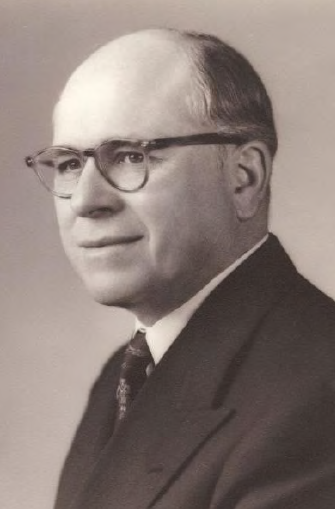 Mr. G. Dewey McDonald was born on a farm near Cherokee, Cherokee County, Iowa, December 27, 1897. One of a family of 12 children, he early learned the “give and take” of life. This experience is reflected in his ability to get along with people, to manage a large enterprise of many employees, and to negotiate in the business work without rancor and without holding grudges. Undoubtedly, his characteristic equanimity of spirit and serenity may be traced directly to his early childhood training. He graduated from the Cherokee High School in 1916. He attended the University of Iowa, but for reasons of health was forced to pursue his college education in another climate. He chose Colorado, where he matriculated in the University of Colorado, Boulder, receiving the Bachelor of Law, LLB degree, 1925. His dairy experience began in 1925 with the Carlson Ice Cream Company, Denver, Colorado. In 1927, he became associated with the Kelviniator Corporation, Detroit. Shortly, thereafter, he connected with the Reid Ice Cream Company, New York. A year’s experience here brought him to the manager ship of the Artic Ice Cream Company, Lansing, Michigan 1928, which position he held for the next six years. In 1934, Mr. McDonald co-founded the Heatherwood Farms Company and became its first and only manager in its 23 years of steady growth. He has built a model, modern milk plant and business, employing quality of finished products as his foremost entry to a large share of Lansing’s milk market. He has earned and maintained a high degree of loyalty from all his employees. Few managers of dairy plants have had the sympathetic, but firm attitude toward dairy college graduates as he. In fact, the Heatherwood Farms Company, under his management, has sought constantly good, college-trained personnel, giving them various responsibilities. Undoubtedly, Mr. McDonald cherishes with pride the knowledge that many of the college men whom he has employed and developed have gone from his employment into greater responsibilities. Extremely loyal to dairy interests, Dewey has always embraced the opportunities, health permitting, to attend and to participate in varied meeting where he felt the cause of better dairying might be enhanced. With equal enthusiasm, he attends meeting of the Parent-Teachers Association, the Dad’s and Mother’s Club, the Lansing Bottle Exchange or the Michigan Milk Dealer’s Association. He has always been a familiar figure at the annual Michigan Allied Dairy Convention and the National Dairy Industries Exposition not missing the latter once during the past 25 years. His dairy loyalty and leadership are of the fist order.
Mr. G. Dewey McDonald was born on a farm near Cherokee, Cherokee County, Iowa, December 27, 1897. One of a family of 12 children, he early learned the “give and take” of life. This experience is reflected in his ability to get along with people, to manage a large enterprise of many employees, and to negotiate in the business work without rancor and without holding grudges. Undoubtedly, his characteristic equanimity of spirit and serenity may be traced directly to his early childhood training. He graduated from the Cherokee High School in 1916. He attended the University of Iowa, but for reasons of health was forced to pursue his college education in another climate. He chose Colorado, where he matriculated in the University of Colorado, Boulder, receiving the Bachelor of Law, LLB degree, 1925. His dairy experience began in 1925 with the Carlson Ice Cream Company, Denver, Colorado. In 1927, he became associated with the Kelviniator Corporation, Detroit. Shortly, thereafter, he connected with the Reid Ice Cream Company, New York. A year’s experience here brought him to the manager ship of the Artic Ice Cream Company, Lansing, Michigan 1928, which position he held for the next six years. In 1934, Mr. McDonald co-founded the Heatherwood Farms Company and became its first and only manager in its 23 years of steady growth. He has built a model, modern milk plant and business, employing quality of finished products as his foremost entry to a large share of Lansing’s milk market. He has earned and maintained a high degree of loyalty from all his employees. Few managers of dairy plants have had the sympathetic, but firm attitude toward dairy college graduates as he. In fact, the Heatherwood Farms Company, under his management, has sought constantly good, college-trained personnel, giving them various responsibilities. Undoubtedly, Mr. McDonald cherishes with pride the knowledge that many of the college men whom he has employed and developed have gone from his employment into greater responsibilities. Extremely loyal to dairy interests, Dewey has always embraced the opportunities, health permitting, to attend and to participate in varied meeting where he felt the cause of better dairying might be enhanced. With equal enthusiasm, he attends meeting of the Parent-Teachers Association, the Dad’s and Mother’s Club, the Lansing Bottle Exchange or the Michigan Milk Dealer’s Association. He has always been a familiar figure at the annual Michigan Allied Dairy Convention and the National Dairy Industries Exposition not missing the latter once during the past 25 years. His dairy loyalty and leadership are of the fist order.
WILLIAM A. MCDONALD
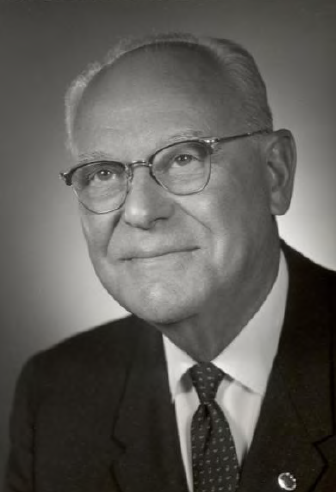 William A. McDonald was born in Lapeer County, Michigan, January 17, 1890. He graduated from Grand Rapids Central High School in 1909 and Michigan State University in 1913 with a Bachelor’s degree in Forestry. Following graduation, he was employed as assistant professor of Forestry Extension, New York State College of Forestry, Syracuse University from 1913-1916. Since 1916 his efforts have been directed to the milk and ice cream business when not in the army. His military service included Michigan and New York Guard, 7 years; Captain Infantry, U.S. Army, 1916-1919; Lt. Colonel Infantry, U.S. Army, World War II; on staff of Commanding General, 6th Service Command and the Pentagon, Washington. He retired successful milk and ice cream business at Flint, Michigan which in 1942 was turned over to their milk producers at net book value, without any charge for goodwill and without any down payment. He was Assistant General Manager until 1947 and General Manager from 1947 to 1962 when he retired but continued as a consultant to the company. The company grew rapidly under his vigorous administration, and the growth pattern has continued since his retirement. Mr. McDonald has given much time to civic activities and dairy industry organizations. His contributions include Director of the Michigan Milk Dealers Association; Director of the National Milk Producers Federation; Director of the American Butter Institute; Director of National Independent Dairies Association; on the Advisory Council, Milk Industry Foundation; and first President, Michigan Dairy Products Association. He was president of Flint Kiwanis Club; on the Genessee County Board of Trustees, 1960-1964; Member of Board of Trustees, 4-H Foundation of Michigan, 1960-1963; Vestryman, St. Paul’s Episcopal Church. Several honors have been received by Mr. McDonald in recognition of his many contributions. These include his selection as Michigan’s Dairyman of the Year in 1956 by Michigan State University; Leadership citation in 1959 by the Michigan Dairy Products Association; Service to Agriculture Award by Michigan Farm Bureau in 1963; Service to Agriculture Award by Michigan Association of Cooperatives in 1962; Michigan State University Distinguished Alumni Award, 1966; and Scholarship Award established in his name through the Michigan Dairy Memorial and Scholarship Foundation.
William A. McDonald was born in Lapeer County, Michigan, January 17, 1890. He graduated from Grand Rapids Central High School in 1909 and Michigan State University in 1913 with a Bachelor’s degree in Forestry. Following graduation, he was employed as assistant professor of Forestry Extension, New York State College of Forestry, Syracuse University from 1913-1916. Since 1916 his efforts have been directed to the milk and ice cream business when not in the army. His military service included Michigan and New York Guard, 7 years; Captain Infantry, U.S. Army, 1916-1919; Lt. Colonel Infantry, U.S. Army, World War II; on staff of Commanding General, 6th Service Command and the Pentagon, Washington. He retired successful milk and ice cream business at Flint, Michigan which in 1942 was turned over to their milk producers at net book value, without any charge for goodwill and without any down payment. He was Assistant General Manager until 1947 and General Manager from 1947 to 1962 when he retired but continued as a consultant to the company. The company grew rapidly under his vigorous administration, and the growth pattern has continued since his retirement. Mr. McDonald has given much time to civic activities and dairy industry organizations. His contributions include Director of the Michigan Milk Dealers Association; Director of the National Milk Producers Federation; Director of the American Butter Institute; Director of National Independent Dairies Association; on the Advisory Council, Milk Industry Foundation; and first President, Michigan Dairy Products Association. He was president of Flint Kiwanis Club; on the Genessee County Board of Trustees, 1960-1964; Member of Board of Trustees, 4-H Foundation of Michigan, 1960-1963; Vestryman, St. Paul’s Episcopal Church. Several honors have been received by Mr. McDonald in recognition of his many contributions. These include his selection as Michigan’s Dairyman of the Year in 1956 by Michigan State University; Leadership citation in 1959 by the Michigan Dairy Products Association; Service to Agriculture Award by Michigan Farm Bureau in 1963; Service to Agriculture Award by Michigan Association of Cooperatives in 1962; Michigan State University Distinguished Alumni Award, 1966; and Scholarship Award established in his name through the Michigan Dairy Memorial and Scholarship Foundation.
JOHN J. MCDONALD
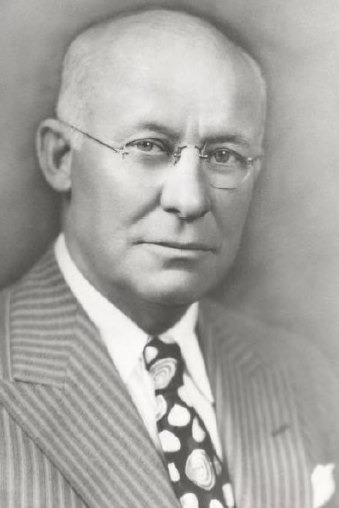 John James McDonald was born September 5, 1884, on a farm in Sanilac County, Michigan, the son of James J. and Caroline Grabill McDonald. He attended grade and high school in Grand Rapids, graduating in 1904. He came to Flint in 1927 and was vice president and general manager of Freeman Dairy Products Co. until 1928, when he organized and was the first president of the McDonald Dairy Company. In 1943, the McDonald Cooperative Dairy Company was formed, and John McDonald was General Manager until his death in May, 1947. In addition to his position with McDonald Cooperative Dairy Company, Mr. McDonald was president of the Harvin Ice Cream Company of Lansing, and Director of McDonald Ice Cream Company of Ann Arbor. He also served as a Director of the Owosso Savings Bank. He served as a Director of the American Dairy Association, and the National Milk Producers Federation, and was active in many dairy industry organizations. Denied many of the things in his youth that boys want, mainly athletic equipment, Mr. McDonald gave generously to the support of sports activities here and sponsored baseball, softball and basketball teams. He also privately contributed to educational funds for boys who otherwise would not have been able to obtain higher education. He was active in numerous civic programs and prominent in Masonic circle. He was survived by his wife Hulda, son J. Gordon McDonald, three brothers, William A., Hugh, and Albert; and a sister, Mrs. Elizabeth Lyons.
John James McDonald was born September 5, 1884, on a farm in Sanilac County, Michigan, the son of James J. and Caroline Grabill McDonald. He attended grade and high school in Grand Rapids, graduating in 1904. He came to Flint in 1927 and was vice president and general manager of Freeman Dairy Products Co. until 1928, when he organized and was the first president of the McDonald Dairy Company. In 1943, the McDonald Cooperative Dairy Company was formed, and John McDonald was General Manager until his death in May, 1947. In addition to his position with McDonald Cooperative Dairy Company, Mr. McDonald was president of the Harvin Ice Cream Company of Lansing, and Director of McDonald Ice Cream Company of Ann Arbor. He also served as a Director of the Owosso Savings Bank. He served as a Director of the American Dairy Association, and the National Milk Producers Federation, and was active in many dairy industry organizations. Denied many of the things in his youth that boys want, mainly athletic equipment, Mr. McDonald gave generously to the support of sports activities here and sponsored baseball, softball and basketball teams. He also privately contributed to educational funds for boys who otherwise would not have been able to obtain higher education. He was active in numerous civic programs and prominent in Masonic circle. He was survived by his wife Hulda, son J. Gordon McDonald, three brothers, William A., Hugh, and Albert; and a sister, Mrs. Elizabeth Lyons.
FRED W. MEYER
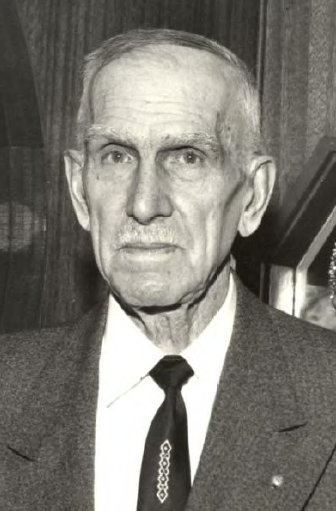 Fred W. Meyer was the second President of the Michigan Milk Producers; Association, serving from 1936 until 1944. He lived his entire life on the St. Clair County farm where he was born. Mr. Meyer became director of MMPA in 1921. Earlier, he had been active in forming and operating a local dairy farmer cooperative in his area, and had managed a number of country receiving stations for creameries buying milk from farms near his home. In 1929, Mr. Meyer was named Treasurer of MMPA, a position he held until elevated to the Presidency. All told, Mr. Meyer’s service as a Director of MMPA spanned 30 years. His tenure as president included the period during which the nation moved from the depths of depression to booming wartime economy. An honorary life directorship in the National Milk Producers’ Federation indicated the high esteem in which Mr. Meyer was held by his fellow dairymen. Besides his service to MMPA, Mr. Meyer was president of Michigan Producers’ Dairy and a director of the Detroit Dairy Council. His community service included the Fairy Haven School Board, St. Clair County Board of Supervisors and the St. Clair County Planning Commission. Mr. Meyer and his wife, Gladys, raised three sons and a daughter. He was active in Farm Bureau in St. Clair County, and helped establish and promote butterfat testing programs and other steps to improve the quality and quantity of milk production in Michigan. Mr. Meyer guided MMPA through the critical years of its “adolescence” and left his mark on the dairy industry of Michigan.
Fred W. Meyer was the second President of the Michigan Milk Producers; Association, serving from 1936 until 1944. He lived his entire life on the St. Clair County farm where he was born. Mr. Meyer became director of MMPA in 1921. Earlier, he had been active in forming and operating a local dairy farmer cooperative in his area, and had managed a number of country receiving stations for creameries buying milk from farms near his home. In 1929, Mr. Meyer was named Treasurer of MMPA, a position he held until elevated to the Presidency. All told, Mr. Meyer’s service as a Director of MMPA spanned 30 years. His tenure as president included the period during which the nation moved from the depths of depression to booming wartime economy. An honorary life directorship in the National Milk Producers’ Federation indicated the high esteem in which Mr. Meyer was held by his fellow dairymen. Besides his service to MMPA, Mr. Meyer was president of Michigan Producers’ Dairy and a director of the Detroit Dairy Council. His community service included the Fairy Haven School Board, St. Clair County Board of Supervisors and the St. Clair County Planning Commission. Mr. Meyer and his wife, Gladys, raised three sons and a daughter. He was active in Farm Bureau in St. Clair County, and helped establish and promote butterfat testing programs and other steps to improve the quality and quantity of milk production in Michigan. Mr. Meyer guided MMPA through the critical years of its “adolescence” and left his mark on the dairy industry of Michigan.
HOWARD F. SIMMONS
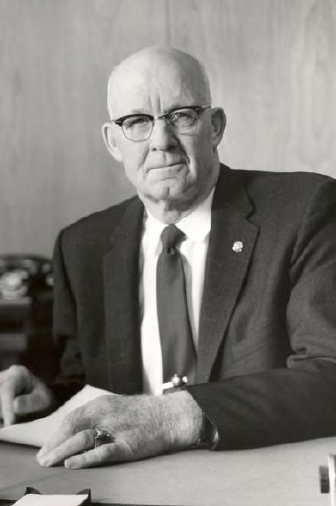 Howard F. Simmons, son of Edward and Margaret Simmons, was born in Bloomfield Township, Nebraska, December 27, 1893. At an early age he moved with his parents to Michigan. Living near Greenville, he attended school in Montcalm County, later being employed as a teacher in one of its rural schools. Following his teaching experience, Mr. Simmons entered Michigan Agricultural College where he completed a two-year short course in agriculture. He then served as the tester for the Genesee County Dairy Herd Improvement Association. With this dairy background experience, Mr. Simmons was employed by the Michigan Milk Producers’ Association as a butterfat tester. Progressively he served as a field man, director of field services, and assistant manager before becoming manager in 1942, which position he held until retirement after over 15 years. During this time the Association experienced its greatest growth. In 1942 Michigan Milk Producers’ Association sold slightly over 1 billion pounds of milk for its members for approximately 27 million dollars. In 1957 more than 2 billion pounds of member milk were sold for a total of more than 97 million dollars. Mr. Simmons is respected as one of the truly great dairy cooperative managers and a foremost authority on milk marketing. He served for eight years on the board of directors of the National Milk Producers’ Federation and with many committees of that organization. For eight years also Mr. Simmons served as a director of the National Dairy Council. In addition to his association work, Howard Simmons was on the Board of Directors of the Detroit Dairy Council, the Michigan Allied Dairy Association, which he served as president, the Michigan Dairy Farmers Federation, and the Michigan Dairy Memorial Scholarship Foundation. Among Mr. Simmons activities also was membership on the advisory council of the Michigan Association of Farmer Cooperatives and his contribution to a special committee to aid the Michigan Superintendent of Public Instruction in formulating the policies of the Special School Milk Program. During World War II, Mr. Simmons served in an advisory capacity to the Office of Defense Transportation and to the War Food Administration.
Howard F. Simmons, son of Edward and Margaret Simmons, was born in Bloomfield Township, Nebraska, December 27, 1893. At an early age he moved with his parents to Michigan. Living near Greenville, he attended school in Montcalm County, later being employed as a teacher in one of its rural schools. Following his teaching experience, Mr. Simmons entered Michigan Agricultural College where he completed a two-year short course in agriculture. He then served as the tester for the Genesee County Dairy Herd Improvement Association. With this dairy background experience, Mr. Simmons was employed by the Michigan Milk Producers’ Association as a butterfat tester. Progressively he served as a field man, director of field services, and assistant manager before becoming manager in 1942, which position he held until retirement after over 15 years. During this time the Association experienced its greatest growth. In 1942 Michigan Milk Producers’ Association sold slightly over 1 billion pounds of milk for its members for approximately 27 million dollars. In 1957 more than 2 billion pounds of member milk were sold for a total of more than 97 million dollars. Mr. Simmons is respected as one of the truly great dairy cooperative managers and a foremost authority on milk marketing. He served for eight years on the board of directors of the National Milk Producers’ Federation and with many committees of that organization. For eight years also Mr. Simmons served as a director of the National Dairy Council. In addition to his association work, Howard Simmons was on the Board of Directors of the Detroit Dairy Council, the Michigan Allied Dairy Association, which he served as president, the Michigan Dairy Farmers Federation, and the Michigan Dairy Memorial Scholarship Foundation. Among Mr. Simmons activities also was membership on the advisory council of the Michigan Association of Farmer Cooperatives and his contribution to a special committee to aid the Michigan Superintendent of Public Instruction in formulating the policies of the Special School Milk Program. During World War II, Mr. Simmons served in an advisory capacity to the Office of Defense Transportation and to the War Food Administration.
CLARENCE BALLARD SMITH
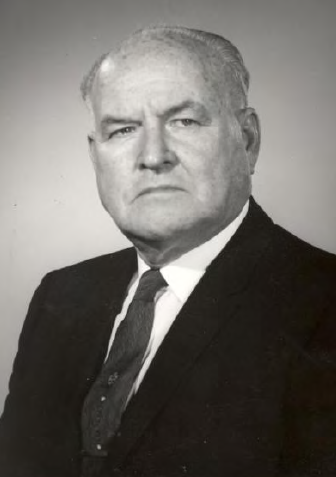 Clarence Ballard Smith was born May 7, 1897 in Henry County, Kentucky and died of a heart attack April 5, 1962, aged 64 years, 10 months, and 28 days. Mr. Smith grew to manhood in the Henry County, Kentucky community and graduated from the Shelbyville High School. He was interested in cattle from a very young age and became a manager-herdsman and partner with Clark & Smith Echo Farms at Long Run, Kentucky. In 1926 he came to Flint Michigan and was employed at Chevrolet for two years. Not being a factory man, he took a job with the Baynewood Holstein Farms at Rodeo, Michigan for two years at which time the herd was dispersed. Following one summer as farm manager for the Detroit Creamery Farm at Mt. Clements, he accepted a position with a Dr. Evans Guernsey farm near Pinconning in 1931, where he stayed for more than five years as farm manager. Following Dr. Evans’ death and dispersal of the herd, Mr. Smith purchased the farm. Auctioneering was another lifelong ambition which he pursued and successfully achieved the distinction of being one of the best. He located at Williamston and built the Wolverine Purebred Livestock Sales Pavilion in 1946. The 200th sale was held the day following his funeral. He served two years in naval aviation during World War I. He is a past president of the National Auctioneers’ Association and also of the Michigan Association. He was a vigorous promoter of the Michigan Holstein Association and attended most every state and national function concerning the breed. He traveled extensively throughout the United States and Canada to select cattle for his Classic and Invitational sales, selling private herds or helping other sale managers in consignments. One of his regular chores was at the Earlville sales, where he worked for more than 25 years. He was a keen judge of cattle, and his own herd was classified as some of the best Holsteins in the state. He was a regular “Blue Ribbon” winner in the state shows and fairs, and could always be found “up close” if not at the top in many international shows. Recognition of his leadership qualities was evident in his selection to head the Bureau of Animal Industry for the State of Michigan during 1936 and 1937 and his appointment to the Agricultural Commission from October 1949 to October 1955. Mr. Smith was not only a great promoter of good cattle for the breeder and commercial dairyman but was also deeply interested in youth and 4-H Holstein club work. He also worked closely and cooperated with many Michigan State University Dairy Department activities.
Clarence Ballard Smith was born May 7, 1897 in Henry County, Kentucky and died of a heart attack April 5, 1962, aged 64 years, 10 months, and 28 days. Mr. Smith grew to manhood in the Henry County, Kentucky community and graduated from the Shelbyville High School. He was interested in cattle from a very young age and became a manager-herdsman and partner with Clark & Smith Echo Farms at Long Run, Kentucky. In 1926 he came to Flint Michigan and was employed at Chevrolet for two years. Not being a factory man, he took a job with the Baynewood Holstein Farms at Rodeo, Michigan for two years at which time the herd was dispersed. Following one summer as farm manager for the Detroit Creamery Farm at Mt. Clements, he accepted a position with a Dr. Evans Guernsey farm near Pinconning in 1931, where he stayed for more than five years as farm manager. Following Dr. Evans’ death and dispersal of the herd, Mr. Smith purchased the farm. Auctioneering was another lifelong ambition which he pursued and successfully achieved the distinction of being one of the best. He located at Williamston and built the Wolverine Purebred Livestock Sales Pavilion in 1946. The 200th sale was held the day following his funeral. He served two years in naval aviation during World War I. He is a past president of the National Auctioneers’ Association and also of the Michigan Association. He was a vigorous promoter of the Michigan Holstein Association and attended most every state and national function concerning the breed. He traveled extensively throughout the United States and Canada to select cattle for his Classic and Invitational sales, selling private herds or helping other sale managers in consignments. One of his regular chores was at the Earlville sales, where he worked for more than 25 years. He was a keen judge of cattle, and his own herd was classified as some of the best Holsteins in the state. He was a regular “Blue Ribbon” winner in the state shows and fairs, and could always be found “up close” if not at the top in many international shows. Recognition of his leadership qualities was evident in his selection to head the Bureau of Animal Industry for the State of Michigan during 1936 and 1937 and his appointment to the Agricultural Commission from October 1949 to October 1955. Mr. Smith was not only a great promoter of good cattle for the breeder and commercial dairyman but was also deeply interested in youth and 4-H Holstein club work. He also worked closely and cooperated with many Michigan State University Dairy Department activities.
JOHN HETSLER STEWART
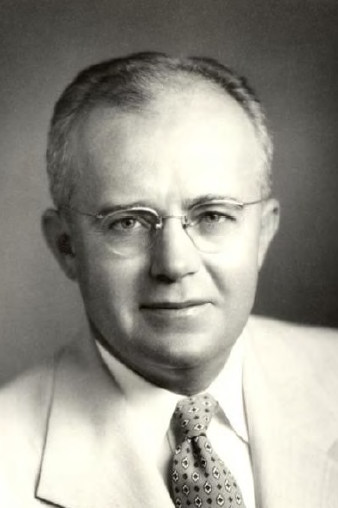 John Hetsler Stewart, son of John M. and Telitha Jane Stewart, was born in Ridgeville, Indiana, November 8, 1903. He graduated from the Ridgeville, Indiana High School in 1921. Following high school, he pursued studies in business administration and accounting by attending night classes at the University of Michigan, Wayne University, and the Walsh Institute. From 1925 to 1932 Mr. Stewart was employed as an accountant with A. Harvey Sons, Detroit wholesale plumbers. In March, 1933, he became affiliated with the Twin Pines Farm Dairy at Detroit as bookkeeper, which position he held until 1935. From 1935 to 1939, he was office manager and treasurer; 1939 to 1941 he served the company as its general manager. In May, 1941, he became president of Twins Pines Farm Dairy, which position he held to the present date. Distinguished a career as John Hetsler Stewart had in the business side of dairying, his achievement in reorganizing the Twin Pines Farm Dairy into a distributor owned dairy probably surpasses all others. For a large dairy to have independently owned milk routes was Stewart’s dream. This plan was effected in 1941 and since grasped by other dairies. The plan of route men owning their routes and thus becoming small independent businessmen themselves was revolutionary, even almost heretic. Mr. Stewart has been president of the Detroit Milk Association, Treasurer of the Michigan Dairy Products Association, and president of the Detroit Dairy Technology Society. Important as these positions are, they pale in the light of the national leadership in pioneering a new business relationship with employees, which led solidarity to the milk unit of the great industry.
John Hetsler Stewart, son of John M. and Telitha Jane Stewart, was born in Ridgeville, Indiana, November 8, 1903. He graduated from the Ridgeville, Indiana High School in 1921. Following high school, he pursued studies in business administration and accounting by attending night classes at the University of Michigan, Wayne University, and the Walsh Institute. From 1925 to 1932 Mr. Stewart was employed as an accountant with A. Harvey Sons, Detroit wholesale plumbers. In March, 1933, he became affiliated with the Twin Pines Farm Dairy at Detroit as bookkeeper, which position he held until 1935. From 1935 to 1939, he was office manager and treasurer; 1939 to 1941 he served the company as its general manager. In May, 1941, he became president of Twins Pines Farm Dairy, which position he held to the present date. Distinguished a career as John Hetsler Stewart had in the business side of dairying, his achievement in reorganizing the Twin Pines Farm Dairy into a distributor owned dairy probably surpasses all others. For a large dairy to have independently owned milk routes was Stewart’s dream. This plan was effected in 1941 and since grasped by other dairies. The plan of route men owning their routes and thus becoming small independent businessmen themselves was revolutionary, even almost heretic. Mr. Stewart has been president of the Detroit Milk Association, Treasurer of the Michigan Dairy Products Association, and president of the Detroit Dairy Technology Society. Important as these positions are, they pale in the light of the national leadership in pioneering a new business relationship with employees, which led solidarity to the milk unit of the great industry.
RALPH ACHESON SULLIVAN
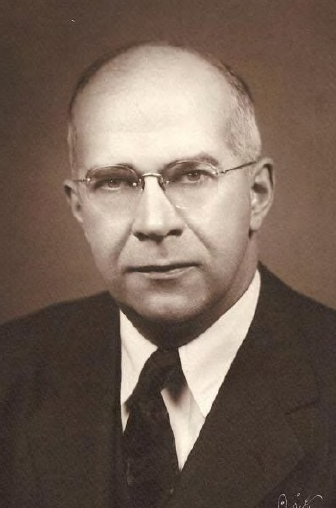 Ralph Acheson Sullivan, son of F. W. and Sarah Acheson Sullivan, was born in Erie, Pennsylvania, on December 15, 1898. Migrating to Michigan at an early date, he graduated from the Battle Creek High School in 1917. Later, he attended the University of Michigan, Ann Arbor, 1919 to 1920, and Iowa State University, Ames, 1921 to 1924, where he received the bachelor’s degree in Dairy Industry. Returning to Michigan, Ralph Sullivan began his long career with the dairy industry, being associated with his father’s Sullivan Milk Products Company, Battle Creek, Michigan. Always a zealot for quality dairy products, he devoted himself to the betterment of dairy products and the industry in which his life centered. Not only has he worked on many legislative dairy committees, but also served the Michigan Ice Cream Dealers Association as its secretary for sometime. Few men have loved the dairy industry and given themselves to its progress and betterment as has Ralph Acheson Sullivan of Battle Creek.
Ralph Acheson Sullivan, son of F. W. and Sarah Acheson Sullivan, was born in Erie, Pennsylvania, on December 15, 1898. Migrating to Michigan at an early date, he graduated from the Battle Creek High School in 1917. Later, he attended the University of Michigan, Ann Arbor, 1919 to 1920, and Iowa State University, Ames, 1921 to 1924, where he received the bachelor’s degree in Dairy Industry. Returning to Michigan, Ralph Sullivan began his long career with the dairy industry, being associated with his father’s Sullivan Milk Products Company, Battle Creek, Michigan. Always a zealot for quality dairy products, he devoted himself to the betterment of dairy products and the industry in which his life centered. Not only has he worked on many legislative dairy committees, but also served the Michigan Ice Cream Dealers Association as its secretary for sometime. Few men have loved the dairy industry and given themselves to its progress and betterment as has Ralph Acheson Sullivan of Battle Creek.
Full PDF: 1957 - 1966



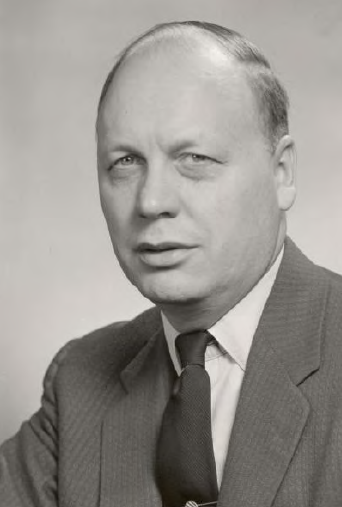
 Print
Print Email
Email